Social signals are interaction metrics found on social media such as YouTube, Facebook, Twitter, Tiktok, Medium, and more. These metrics reflect human interaction with brands through views, shares, likes, pins, and comments.
These human interactions can contribute to a page or website’s organic rankings on a search engine. Lately, marketers are capitalizing on the relevance of social signals on SEO and streamlining their marketing processes to accommodate it. However, many brands still haven’t figured how much of an impact social signals have on SEO rankings and marketing strategy.
In this article, we’ll take a deep dive into social signals, their correlation with search engine rankings, and how you can leverage them for your social media SEO. But first, how does it all connect? Let’s start from the top.
What's the connection between search engines and social signals?
The link between search engines and social signals is both straightforward and complex. On the one hand, search engines like Google include social signals in search results, especially for branded terms and news stories.
For example, if you made a branded search on Google for Starbucks, you’d probably see content from their social media profile in the search results. Google is pulling content that it feels a searcher might find relevant into the search results.
Here is an example of a search for Starbucks.
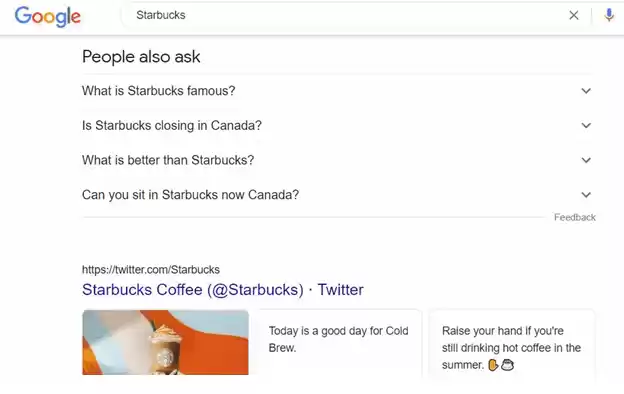
Google sometimes does the same thing when you search for a story in the news. For example, when I search for “fires Washington State”, the Twitter feed of the Washington Department of Natural Resources Department appears in the search results.
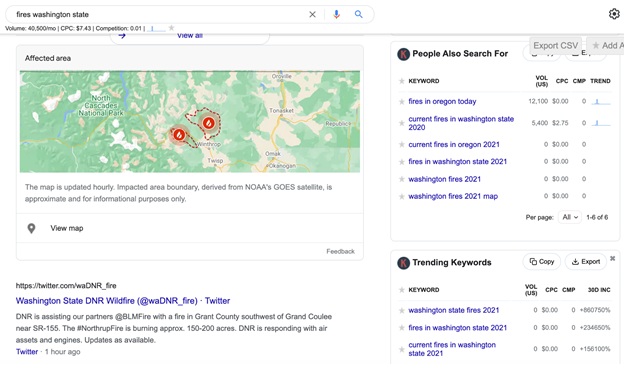
To be clear, Google isn’t including social media results here based on social signals. It provides the social accounts that it feels are relevant to the search intent.
The second way that social signals impact SEO is indirect.
Social media is a great place to give your content great visibility and build an audience. If lots of people see your content, for example, when a story goes viral, they are likely to link to your website or article.
SEO experts agree there is a direct relationship between search rankings and backlinks.
Let me give you an example to make my point.
Back in 2014, ALS got global attention for its Ice Bucket Challenge. That story generated global media attention. When ALS is discussed in the news, they often reference the ALS Association and the Ice Bucket Challenge.
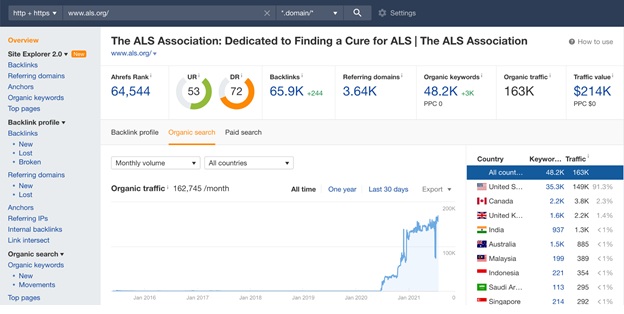
The screenshot below shows where the site has been referenced. The website has been referenced in publications like CNN, Bloomberg, and others.
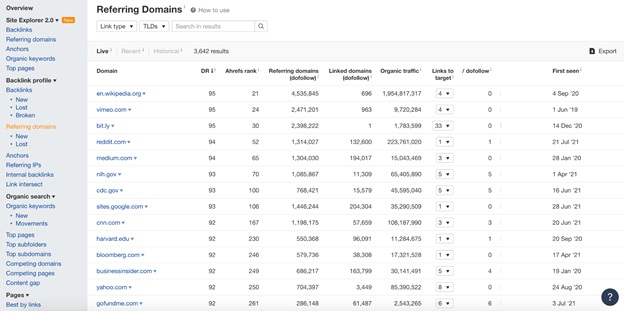
All of those backlinks, which are the indirect result of that social media exposure, can help the site rank in the search results for various terms.
The second indirect way that social signals can impact your site is through branded search. Branded searches are when someone looks for your site and search for your company name and another phrase. For example, “CNN news”.
When people make branded searches, they are telling Google to associate your brand with a topic. Those branded searches can help you rank higher in Google. You’ll often see a correlation between a company with a strong social media presence and the volume of branded searches.
So, now you know three ways that social signals can impact your search results.
How To Boost Your SEO With Social Signals
Social signals are essential for a robust content marketing strategy.
That means, if you don’t get your social media marketing game up, you’ll be left in the dust by those who do. Now, let’s look at how you can improve your SEO strategy with social signals.
1. Create Content People Want to Share
The key to generating social media engagement is creating content that people want to share. If your content is boring or doesn’t ask or answer a question, people are less likely to share it or engage with it. Quality social content, though, will be shared by more people and can start a conversation around your brand. Here’s an example:
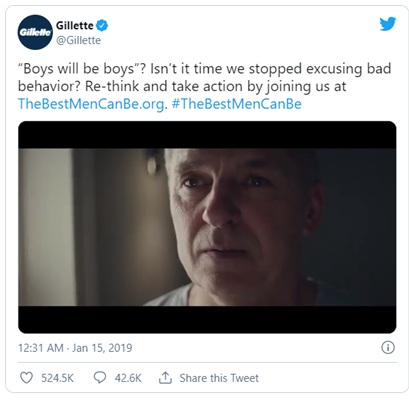
For its 2019 advocacy campaign, Gillette launched a now-viral tweet discussing bullying and harassment done by males in its various forms. The tweet, which included a link to the websiteTheBestMenCanBe.org, didn’t just have 524,000 likes and 284,000 shares as of 2021. It has also sparked a fierce debate about what people mean when they say “boys will be boys”.
As a result of the conversation that started around the campaign, Gillette’s advocacy was also picked up by major websites, such as Yahoo! News and AdAge, both of which linked back to the campaign website:

The domain is now redirecting to a page on Gillette’s website, but it still serves its purpose: to drive meaningful conversations about diversity, inclusion, and empathy. As long as men everywhere seek to change for the better, Gillette will help them become the best men they can be.
2. Establish a Strong Branded Social Presence
While social media doesn’t directly contribute to higher search engine rankings for your website, it still plays an important role in generating branded search traffic. Branded search is any search that includes the name of your business, as opposed to a non-branded search, which is far less specific.
A branded search shows a certain degree of interest in your business - the user has already heard of you and would like to know more. Most branded searches rank company websites at the top of search results. However, social media profiles also tend to rank high for branded searches.
For instance, running a search for “fender” won’t take you to a site for auto parts. Instead, the first thing that comes up is a site for Fender Guitars, followed closely by the Fender Company’s official Twitter account:
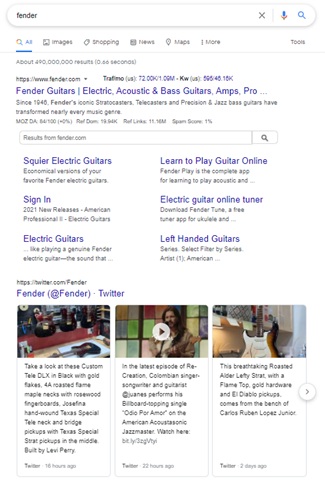
How does this happen? First, many people who search for “fender” are actually looking for the Fender company website, which generates traffic and increases its search ranking. On the other hand, Fender’s Twitter account has almost 700,000 followers, and its content consistently generates engagement - pretty impressive for a music brand.
You might be wondering why you want your social media pages to be near the top of branded searches for your brand if the goal is to improve your own website’s SEO. While your website contains a lot of information about your brand, you probably update your social media accounts more often. Some users also want to be updated on events such as product launches or sales, which you normally announce on social media.
If you regularly post content and engage with your followers, they are more likely to visit your website, boosting its search ranking even further. Thus, a strong social media presence will boost branded searches, whether those searches end up leading to your website or social media pages.
3. Run Social Influencer Campaigns to Generate Reach
If your business operates in a very competitive niche, partnering with the right people can mean the difference between success and failure, especially if you try to promote your product. By collaborating with influencers, you can bring your message across to the influencer’s audience while also generating social proof for your brand.
Most influencers know what their target audience wants to see. They have already built a community around their brand and actively engage with their followers to get their pulse. One study found that 80% of respondents find that influencer-created content performs better than branded content.
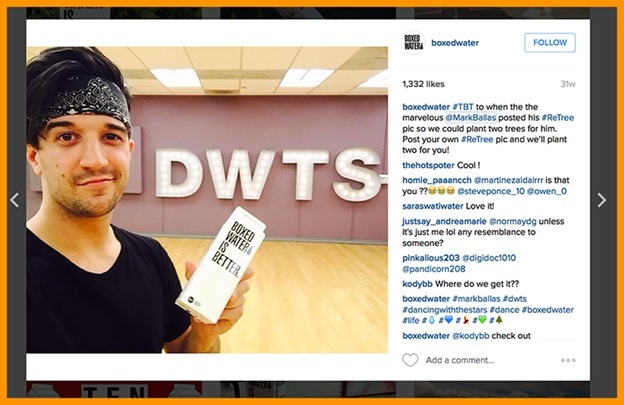
Dancing with the Stars performer Mark Ballas, for example, partnered with Boxed Water to promote its nature-friendly product. By posting his photo and using the #ReTree hashtag, he pledged to let Boxed Water plant two trees in his name - and encouraged people to do the same for the environment.
When people trust a brand, they are more likely to like, share, and comment on anything they do on social media. When you partner with the right influencers, your reach increases further, and more people will see your brand as trustworthy.
Bottom Line
Much like many marketing strategies, social signals can produce excellent results, too, if you utilize them efficiently alongside other SEO content strategies. While social signals don’t influence your website’s search rankings directly, you can use them to get people talking about your brand.
First, you need to create social media content that speaks to your audience and encourages them to engage with your brand. This, in turn, will help you establish a strong social media presence that will drive traffic to your online properties through branded searches. Finally, running social influencer campaigns will help you generate content that resonates with different audiences.
By building your brand on social media, you are also helping drive traffic to your site and improving your search engine ranking. Just remember to keep listening to and engaging with your audience to stir up interest in your brand.
Bio: Allie is the Head of Content at Omniscient, a marketing agency that works with SaaS brands. Before working with Omniscient, she spent 5 years as a freelance writer and then joined the content team at HubSpot where she worked for nearly 3 years. She has contributed to more than 100 high-converting articles for HubSpot and collaborated with the folks at Entrepreneur, Hotjar, and Foundr. Her words are bookmarked by entrepreneurs, small business owners, and digital marketers worldwide.

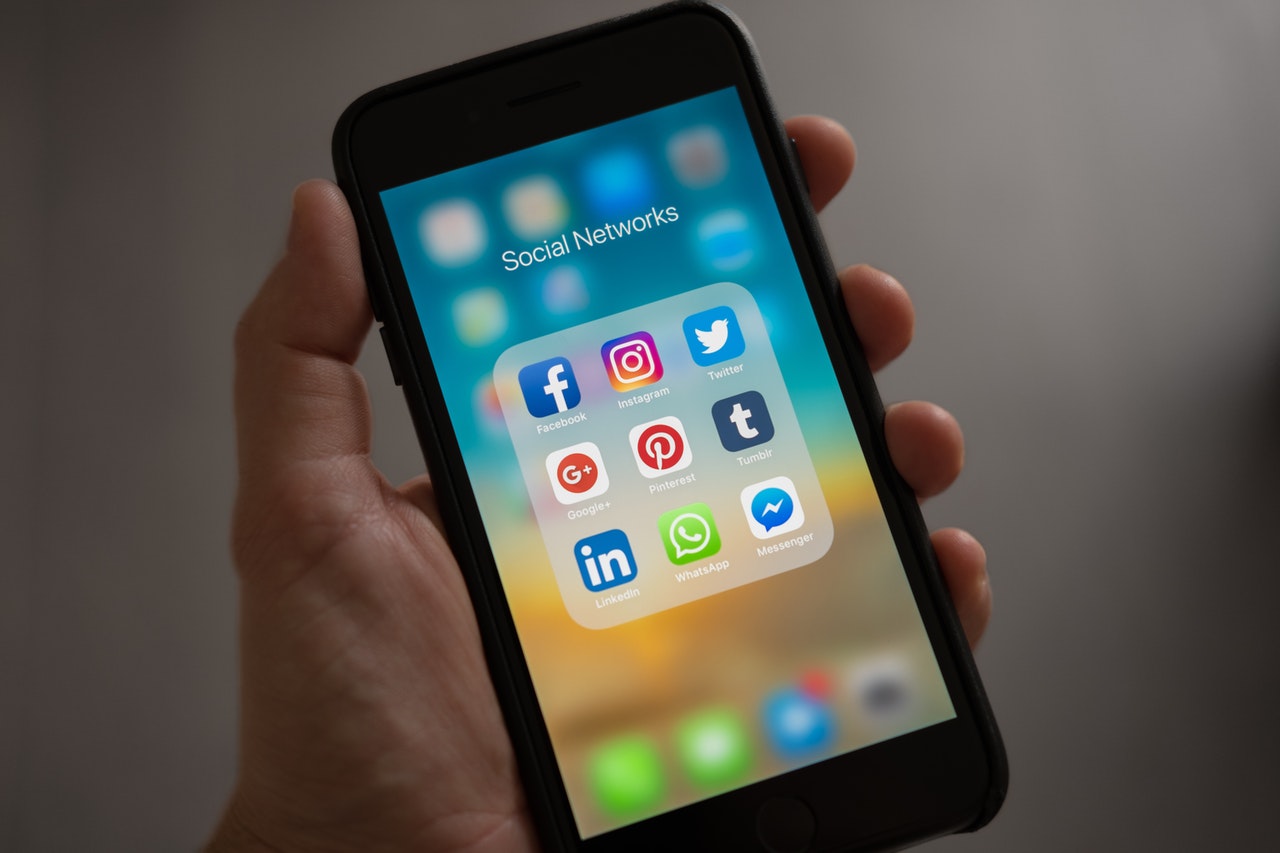
 Table of Content
Table of Content










